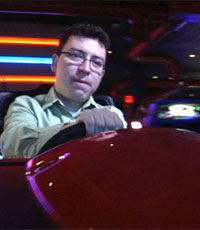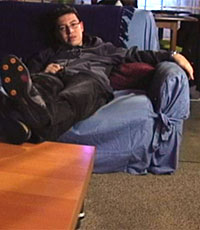


Listen to audio highlights from this interview. 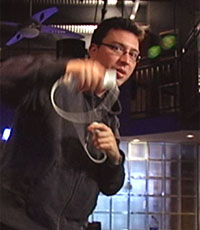
As a kid in Guatemala City, Luis Von Ahn played Street Fighter. With today's game systems, he still packs a punch. 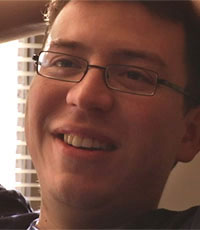
To filter out good ideas from "totally dumb" ones, von Ahn sits with his thoughts for months before launching a project. 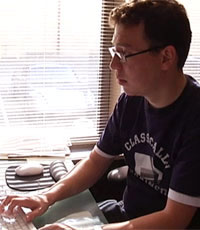
A math major as an undergraduate at Duke (graduating summa cum laude), he made the switch to computer science, in part because the work could impact millions of people. 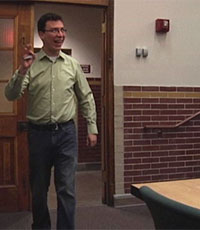
Von Ahn once created a fake website to catch students cheating on their homework. Despite being tough, he's a sought-after teacher. 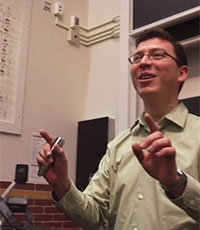
To prepare for class, he rehearses—whispering entire lectures to himself multiple times as he paces around his office. |
A week after becoming an assistant professor at Carnegie Mellon University, computer scientist Luis von Ahn, at the age of 27, learned he was getting a MacArthur "genius" grant. The next week, Popular Science named him one of the "Brilliant 10 Scientists of 2006." Despite it all, von Ahn insists that most of his ideas are "completely idiotic." In this interview, von Ahn delves into a few ideas that are definitely not, however, including how he is tapping into the countless hours people spend playing games in order to solve complex problems that stump computers. Kids like gamesNOVA: Tell me about your first computer. Luis von Ahn: My first computer was a Commodore 64. I got it as a present from my mom when I was eight years old, and all I wanted to do with that computer was play games. In fact, I thought it was essentially like a Nintendo, except it had more games. It used to be the case that computers were a lot harder to use. So if you wanted to actually do things, like copy games from your friends [chuckles], you really had to learn how to program them. I think that made me learn a lot of things. Q: Did you program your own games when you were a kid in Guatemala? von Ahn: Yeah. They were really simple things, like trying to move a guy from one corner of the screen to the other corner, with some obstacles. Most of the games I created I wouldn't play myself. That's exactly when you know a game's not good. But it was fun for me to create the games. Q: How old were you at the time? von Ahn: Probably about 10 to 12. Q: Why do kids like games so much? von Ahn: There are a lot of theories about this. One is that games are like training, and there's an evolutionary advantage for kids to train, right? When you're growing up, you're training for real life. Of course, nowadays I don't know what we're training for with some modern games, other than clicking the button really fast. Q: Tell me about Games With a Purpose. von Ahn: The basic idea of Games With a Purpose is that we are taking a problem that computers cannot yet solve, and we are getting people to solve it for us while they are playing a game. Games are an amazing resource. The average American spends 1.1 hours a day playing computer games. That's a lot of time. By age 21, the average American has played 10,000 hours of video games. That's equivalent to something like five years of a full-time job, by the age of 21. So there's a lot of time being spent on computer and video games. The question is, can we make good use of this time? Can we get you, while you're playing games, to solve some problems that are good for humanity? The ESP phenomenonQ: What's the ESP Game? von Ahn: The ESP Game is an example of a Game With a Purpose. It's a two-player game. When you go to our website [www.gwap.com], you get randomly paired with your partner—a total stranger from the Web. The goal of the game is for you and your partner to type the exact same word, given that the only thing that you two have in common is that you can both see the same image. So you're told, "Type whatever the other guy is typing." What people usually do is type a lot of words related to the common image. They type a lot of words until one of Player 1's words is equal to one of Player 2's words, and they agree, and they get points. It turns out that this word that the players agree on is usually a very, very good description of the image, because it comes from two relatively independent sources. So for an image, say, of a dog, people agree on the word "dog." If we give people a random image from the Web, and they agree on the word "dog," now we know that that image contains a dog. So we're using this game to determine the contents of images on the Web. And a lot of people play this game—literally hundreds of thousands of people. We've collected millions of labeled images using this method. Q: So this game is helping to improve image searches on the Web? von Ahn: Yes. Q: Why can't a computer program just do this work—decipher images? von Ahn: Computers are just not very good at understanding images. The way image search works on the Web is by using filenames. If you search for "dog," you get a lot of images that somebody named "dog.jpg" or "dog.gif." Of course, there are a lot of images named "image1.jpg," right? There's no guarantee that somebody's going to give the image a descriptive label or name it correctly. I could name the image "dog" even though there's no dog in it. So this method's been very prone to errors. Q: How did the ESP Game become a hit? von Ahn: I made a little program—at the time it wasn't called "The ESP Game"—and I tried it with my friends, and they all really liked it. When I took it down, my friends sent me e-mails, "Hey, can I play the game again? Come on, put it back up!" So I thought, Maybe there's something here. Then some of my friends told some other friends, and it became viral. Q: How many people were playing? von Ahn: Oh, a lot of people. We had 200,000 regular players. Q: Were you surprised it was such a success? von Ahn: Yeah, I was very surprised. I liked the game, but I didn't think it would be that great. Q: Was it the first game you ever made that was so popular? von Ahn: It was the first game I made that more than, like, three people wanted to play, yes. [chuckles] Q: How did Google get interested in it? von Ahn: The media started covering it. There was an article in The New York Times—it got all over the place. And at some point, Google invited me to give a talk. So I went with my Ph.D. advisor, Manuel Blum. I gave a talk, and they really liked it, and afterwards they licensed the game—they bought the rights to have their own version. I still run my own version, called the ESP Game, and they run their own version, called the Google Image Labeler. Q: I don't want to get crass, but did you make a lot of money? von Ahn: That was a fairly good payday, that's all I can say, yes. [chuckles] More fun and gamesQ: Why do you generally design games for multiple players? von Ahn: We've done a lot of studies and figured out that people like playing with a partner better; there's just a social component to it. So, for example, we've done the following: We get people to come into the lab to play a game. In 50 percent of the cases we tell them they're playing with another person, and in 50 percent of the cases we tell them, "Oh, you're just playing with a recording of another person." Afterwards we would ask them, "How much did you like the game?" It turns out, the people who thought they were playing with another person liked the game significantly more—even though in both cases, neither was playing with another person. In both cases, they were playing with a recording. Q: What are some of your other Games With a Purpose? von Ahn: There are quite a few. Another game that we have is Tag a Tune, where players are tagging, or labeling, audio clips. In this game, two players listen to a song. With 50 percent probability, they're listening to the same song. With 50 percent probability, they're not. And the players essentially chat with each other to figure out whether they're listening to the same song. If we record the things that people enter in the chat window, we can get exact descriptions of the songs. A lot of people really like this game. Another game that we're working on, which hasn't yet been released, tries to translate text from one language to another one. This is a huge problem, because computers cannot yet do this very well. I'm really excited about this game. The student who came to me with this idea, his name is Severin Hacker. His last name is Hacker—isn't that funny? A computer guy whose last name is Hacker. Q: How do you test a game to know that it's fun? von Ahn: There are many ways to test whether people like a game or not. The most standard is to ask them afterwards, "Did you like this game or not?" But that's kind of lame, and it's well known that people don't report it very well. So my favorite way of testing it was this: We would bring in people to play the game, and we would have an experimenter, a guy or girl who was usually another undergrad. He or she was supposed to pay the players the five bucks for playing half an hour. And what the experimenter would do is give the player the five bucks at the beginning, and then 15 minutes into it, the experimenter would come into the room and say, "Dude, I kinda gotta go. My girlfriend's waiting for me, and I gotta go. But see, you can't leave for another 15 minutes, because otherwise I'll get in trouble. So I'll leave you here, with the computer, and you can do whatever you want. I'm just going to go." The experimenter would leave, and, of course, we kept on watching the people, and if they kept on playing our game, that meant the game was fun. If, on the other hand, they went to, like, Google—that meant it was not fun. That was a really cute way of figuring out whether the game was fun or not. Dumb computers, smart peopleQ: Should people be afraid of smart computers, like HAL in 2001: A Space Odyssey? von Ahn: Science fiction has done a really good job of scaring us into thinking that computers shouldn't get too smart, because as soon as they get really smart, they're going to take over the world and kill us, or something like that. But why would they do that? I really like a quote—this is not mine, this is a professor named Pedro Domingos. He once said that everybody's so worried about computers becoming really, really smart and taking over the world, whereas in reality what's happened right now is computers are really, really dumb and they've taken over the world. It's true, right? We cannot live a day without them; the world cannot function without computers anymore. Yet computers are really stupid, and they've taken over the world. It would be better if they were smarter. Q: A lot of your work is about harnessing human brainpower. What do you think is possible, what can we do if we harness the power of millions of people through the Internet? von Ahn: If you look at humanity's largest projects to date—the Pyramids of Egypt, the Panama Canal—all of these projects took about 100,000 people. Before the Internet, just the coordination problem of getting 100,000 people to do the same thing was really hard, right? But that's not true, with the Internet, anymore. I mean, Yahoo! has 500 million users. One of the things I'm trying to figure out is: What can we do with this many people? If the biggest things that humanity has done up until now required 100,000 people, what can you do when you can get 100 million people working on the same thing? I think we can do amazing things. A tiny example of this is the work on reCAPTCHA for digitizing the books. We have gotten about 300 million people to help digitize books. Most of them don't know it, and most of them have only helped with one word out of a book, but nevertheless this is a project where we've gotten 300 million people to help. Now, imagine if we could get, instead of 10 seconds each, imagine if we could get them for three hours each. What can you do? That's what I'm trying to figure out. I just can't think big enough, yet. Q: How do you know when you have a great idea? von Ahn: I have multiple ideas per day. The vast majority of these are completely idiotic. The way I decide which ones are good is, usually I just sit on the idea for several months. If I'm still thinking about it three, six, or 12 months later, then I actually start working on it. So usually my filter for ideas is just to wait for six months or so. And if I have not decided that it's idiotic, then it might be a good idea. [chuckles] But the vast majority of things that I think about are totally dumb. Genius, slacker, or just hardworking guy?Q: What does getting the MacArthur "genius" award mean for you? von Ahn: A lot of the people that I used to explain my work to would say, "Okay, that's really cool. I grant you that. But how is that science?" After I got the MacArthur Fellowship, people stopped asking that. So I think it gives a lot of legitimacy to your work, and a lot more attention. It just so happened that the week after I got the MacArthur Fellowship, Popular Science put me on a list of the 10 Most Brilliant Scientists of the Year, or something like that. So I got an e-mail from the president of our university saying, "What's next week?" I didn't do anything the next week, and he sent me another e-mail saying, "I'm disappointed." [chuckles] I think he was joking. But there's a component of trying to live up to it, which is hard. It's impossible to live up to the expectations of what it brings. Q: Are there other downsides to winning a MacArthur? von Ahn: One of the downsides of winning a MacArthur Fellowship is, you know, it's called a "genius fellowship." (The MacArthur Foundation claims that they don't like that name, the genius fellowship, but I think they actually like it.) So now that you've won the genius fellowship, every time you do something stupid—which happens all the time, with me—it's always the same joke: "Haha, I thought you were a genius." So you really can't do anything stupid anymore. But I do stupid stuff all the time. That's almost gone away though, fortunately. It only lasted about a year. So if you get MacArthur, it'll only last about a year. Q: Did your girlfriend treat you differently? von Ahn: No. My girlfriend did not treat me any differently. In fact, I think she made a really clear effort not to treat me differently. And I think that's good for our relationship. Even the day I got it, I was still taking out the trash, I was still cooking. Q: What do you do outside of work? von Ahn: I watch a lot of TV. It's probably not so good, but hey, I like it. Another thing that I don't do—and this is funny, this is very rare for someone at a university—I don't read any books. The last book I read was The Da Vinci Code, like, when it came out. It was an okay book; I liked it. But it's just so slow to read books compared to watching a movie, and you can turn your brain off. Most people say, "Oh, TV is so bad because you're not using your brain." See, I use my brain all day long for my work. Precisely what I want is not to use my brain. That's what I want. So I love TV; it's great. Q: So you're a guy who watches TV for fun. Would you say you're a slacker? von Ahn: Am I a slacker? I can be a slacker. When I was in college, most people got summer jobs for college or did research during college. I went home and watched TV the whole day for three months; it was really awesome. So I can be a slacker, but I'm usually not one. Especially as of the last few years, I somehow have become very driven. Q: Do you still play computer games, like you did as a boy? von Ahn: Outside of my work, I assume? Games play a very important role in my work, so I definitely play games—Nintendo DS, or the Wii, and some computer games. But it's become more of a work thing than a play thing for me. I guess that's kind of sad. Most of the time that I'm playing games, it's actually work. And it's funny, as soon as it's actual work, it's not as enjoyable. |
"The average American spends 1.1 hours a day playing computer games." "What can you do when you can get 100 million people working on the same thing? I think we can do amazing things." "Even the day I got it [the MacArthur], I was still taking out the trash." |
|||||||||
|
Interview conducted on November 6, 2008 by Josh Seftel, producer of "Profile: Luis von Ahn," and edited by Susan K. Lewis, senior editor of NOVA Online |
|||||||||||
|
© | Created April 2009 |
|||||||||||
